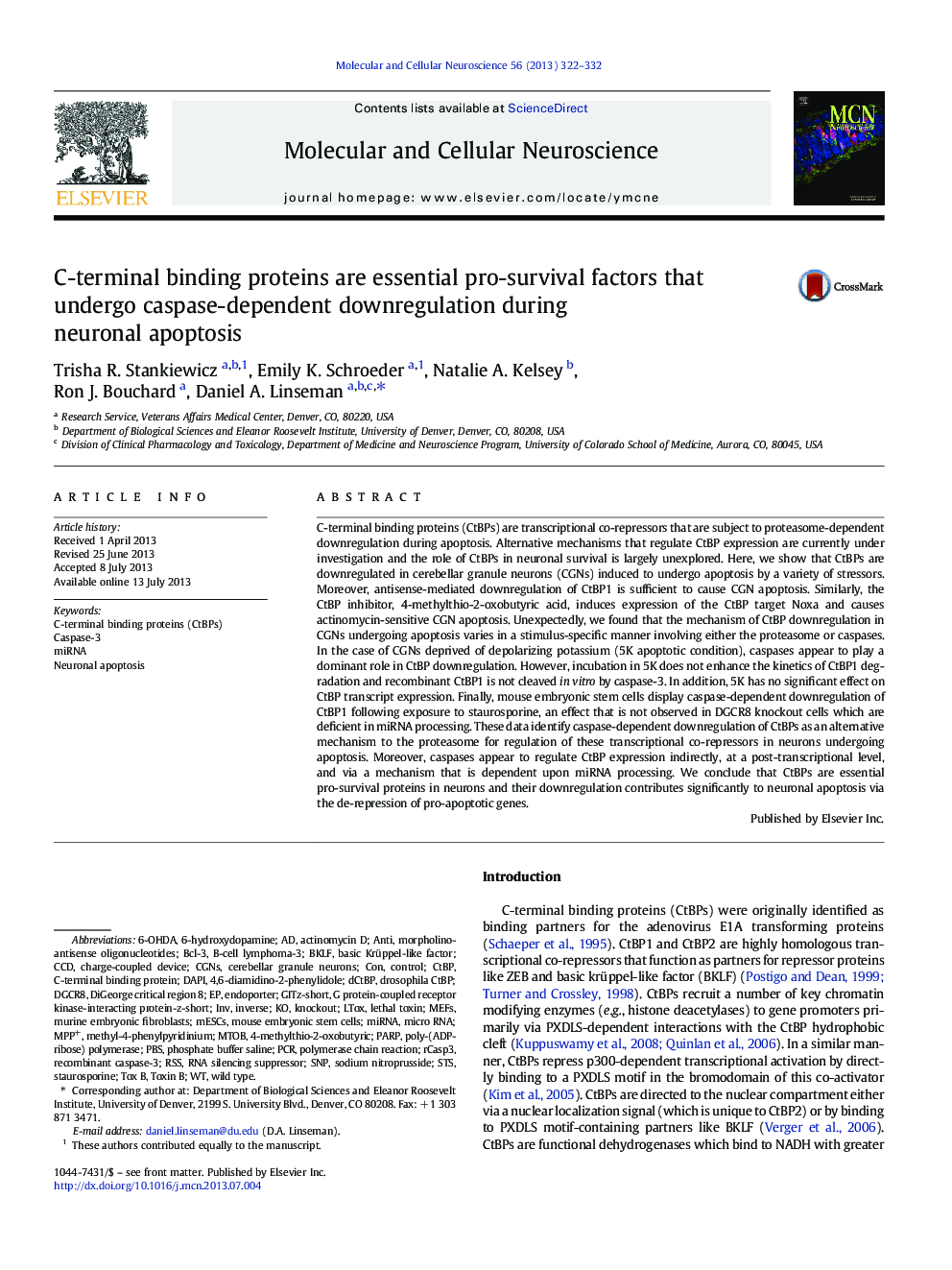| Article ID | Journal | Published Year | Pages | File Type |
|---|---|---|---|---|
| 8478670 | Molecular and Cellular Neuroscience | 2013 | 11 Pages |
Abstract
C-terminal binding proteins (CtBPs) are transcriptional co-repressors that are subject to proteasome-dependent downregulation during apoptosis. Alternative mechanisms that regulate CtBP expression are currently under investigation and the role of CtBPs in neuronal survival is largely unexplored. Here, we show that CtBPs are downregulated in cerebellar granule neurons (CGNs) induced to undergo apoptosis by a variety of stressors. Moreover, antisense-mediated downregulation of CtBP1 is sufficient to cause CGN apoptosis. Similarly, the CtBP inhibitor, 4-methylthio-2-oxobutyric acid, induces expression of the CtBP target Noxa and causes actinomycin-sensitive CGN apoptosis. Unexpectedly, we found that the mechanism of CtBP downregulation in CGNs undergoing apoptosis varies in a stimulus-specific manner involving either the proteasome or caspases. In the case of CGNs deprived of depolarizing potassium (5K apoptotic condition), caspases appear to play a dominant role in CtBP downregulation. However, incubation in 5K does not enhance the kinetics of CtBP1 degradation and recombinant CtBP1 is not cleaved in vitro by caspase-3. In addition, 5K has no significant effect on CtBP transcript expression. Finally, mouse embryonic stem cells display caspase-dependent downregulation of CtBP1 following exposure to staurosporine, an effect that is not observed in DGCR8 knockout cells which are deficient in miRNA processing. These data identify caspase-dependent downregulation of CtBPs as an alternative mechanism to the proteasome for regulation of these transcriptional co-repressors in neurons undergoing apoptosis. Moreover, caspases appear to regulate CtBP expression indirectly, at a post-transcriptional level, and via a mechanism that is dependent upon miRNA processing. We conclude that CtBPs are essential pro-survival proteins in neurons and their downregulation contributes significantly to neuronal apoptosis via the de-repression of pro-apoptotic genes.
Keywords
CGNsMTOBmESCsCtBPBCL-3DGCR8PARPMEFsDAPIRSS6-HydroxydopamineSTS6-OHDAPBSINVCCDMPP+micro RNANeuronal apoptosisstaurosporineactinomycin Dcontoxin BCharge-Coupled DeviceRNA silencing suppressorMouse embryonic stem cellsLethal toxinantiphosphate buffer salinemurine embryonic fibroblastsInverseMiRNAknockoutcerebellar granule neuronswild typesodium nitroprussidepolymerase chain reactionPCRC-terminal binding proteinpoly-(ADP-ribose) polymeraseSNPCaspase-3Control
Related Topics
Life Sciences
Biochemistry, Genetics and Molecular Biology
Cell Biology
Authors
Trisha R. Stankiewicz, Emily K. Schroeder, Natalie A. Kelsey, Ron J. Bouchard, Daniel A. Linseman,
